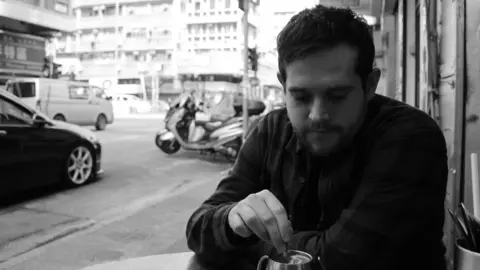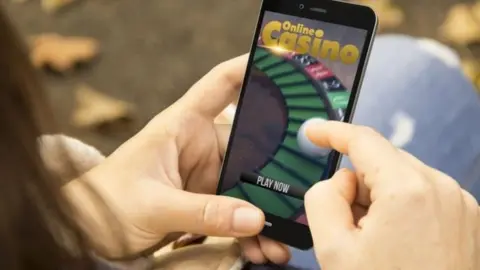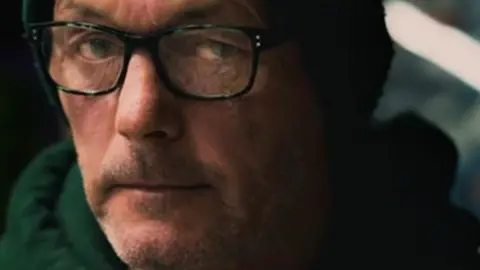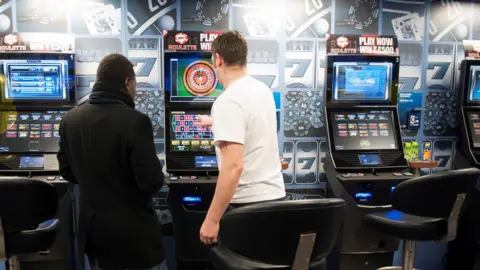Online gambling: Former addicts worry for next generation
 Darren Crocker
Darren CrockerFrequently coined the "crack cocaine of gambling", fixed odds betting terminals (FOBTs) have regularly come under criticism.
The machines allow punters to bet up to £100 every 20 seconds, which campaigners say can lead to addiction and social problems.
That could change as the maximum stake is reduced to £2 in April, but some are saying a lot more needs to be done to combat problem gambling.
Darren Crocker, a recovering gambling addict from Aberdeen, lost £5,000 in a "matter of minutes" at the height of his addiction.
It started with innocuous bets on the football every Saturday. Then Tuesday. Then Wednesday. Then "random teams on a Friday morning".
He was soon introduced to in-play betting, when bets can be placed during games rather than beforehand.
'More sinister'
"It was good and fun natured when it was going into the bookies at the weekend and having a bet with your friends, I don't think there's anything wrong with that," he recalls, sounding a little nostalgic as he describes those early days gambling with friends.
"It became more sinister and more serious when you could do this via your phone or your laptop because there is no control measure there. You are your own bookmaker with this, and I find it quite terrifying."
Now able to bet remotely, Darren had entered a different world of gambling.
 Getty Images
Getty ImagesHe no longer needed to place his bets from the high street, but instead started gambling from his living room, the bus stop or the pub.
He was "bombarded" with offers and emails inviting him to gamble on online casinos.
Darren soon became hooked, betting thousands on the virtual games you can find on FOBTs, such a blackjack and roulette.
What separated Darren from those who only use FOBTs was that when the bookies closed, Darren could continue gambling into the night online.
He was able to place stakes five times higher than the maximum allowed on a FOBT. "I was putting on £500 spins."
'Drive them online'
He explained: "Sometimes you don't even need to watch the spin come through on the roulette wheel, you can just do 'click click click click' and then that's it, you're done, and you can do a horrible amount of damage in a short space of time.
"When you're online, you're just carrying around a mini roulette table on your laptop or your phone.
"People aren't gambling in their living room with their family whilst they're watching the telly, people are in their rooms saying they're answering emails or they've just got something quick to do or 'I'm just going to buy this online', within minutes, thousands of pounds you can be losing, very very easily".
Darren sees the forthcoming restrictions on FOBTs as an important step in combating problem gambling, but he believes it is equally as important for the remote gambling industry to be more stringently regulated.
He explained: "The minimum stake that's being reduced to £2, okay that's good but what it will do to the people who are using these machines who have serious problems, it's going to drive them online.
"A lot of people are online already, but I can see a spike of people coming online and betting more if I'm honest."
The Gambling Commission say they are continually exploring ways to make gambling safer, and that online gambling has the benefit of tracking consumers play - so there is "no excuse if operators fail to identify players that are starting to show signs of problematic gambling".
'Lives being ruined'
Darren also believes the impact of online betting is not yet fully understood: "People's lives are being ruined daily, and it's a very underground thing.
"I don't think anyone really appreciates the extent of this, especially in young people.
"We're just starting to understand how social media effects how our brains work. Gambling online is just as new as social media. I worry about the next generation.
"I'm worrying about people who are 15, 16, 17 because for a lot of the kids now that are playing online games, it's all the same systems, and it's all the same colours and reward systems and noises and these loot boxes and crates and all these things.
"Sometimes these games are set up in a very very similar format to slots and bonus games within slots.
"I worry that the next generation is going to take this on and become problem gamblers."
Martin Paterson from Coatbridge spent over a decade addicted to FOBTs, losing thousands and accruing large debts.
 Martin Paterson
Martin PatersonSince he last used one of the machines five years ago, he has become well known for campaigning against them.
But like Darren, Martin believes the remote gambling industry should also face further regulation.
He said: "If anybody's got a gambling disorder and the FOBT machines aren't available for them, they'll be online if they're not already online, under the duvet gambling."
You would be just as hard-pressed to find any recovering gambling addicts who do not welcome the forthcoming restrictions, as you would any who believe the restrictions in themselves are enough to combat problem gambling.
Many feel the reduction of the stake will help prevent people developing gambling addictions, but also that it will do little if anything to help those who already have a gambling problem.
Young gamblers
Both Martin and Darren feel passionately that those with an addiction to gambling should talk to anyone they can. Failure to do so, Martin says, can be catastrophic: "I've got a few friends who have committed suicide through gambling.
"People that were probably at the end of the road and couldn't come forward and say 'I've got a problem' because of the stigma attached to a gambler. It's quite horrendous".
In response the Gambling Commission told us: "We know from family members we have met that the impact from situations like this are devastating and far reaching."
They said they will continue to hold the industry to account to tackle gambling related harm, and that in the last financial year operators paid £18m in penalty packages because they failed to follow their rules.
In his October budget, Chancellor Phillip Hammond announced he would increase remote gaming duty on online games of chance to 21%, in order to fund the loss of revenue from FOBTs.
With the government relying on the success of the remote gambling industry to offset the loss, Martin is concerned that ministers will lack the political will to further regulate online gambling.
Martin also echoed Darren's concerns about loot boxes in computer games, saying that they, along with pop ups and adverts, are "grooming" children to become gamblers.
 PA
PAThey both had reservations about betting advertisements, which Martin says have "saturated" football and "normalised gambling".
A quarter of the clubs in the Scottish Premier League, as well as almost half of those in England's equivalent, have a betting company as a shirt sponsor.
Darren finds the volume of advertisements in football frustrating: "If an advertisement comes on with bet in play for example, I'm not interested, but it doesn't mean I don't like sports anymore, I love football, I love sports, I still want to enjoy it. I feel like it's an intruder. I feel like it's a constant reminder and that's what's upsetting".
"Just look at the football teams. You think back in the 90s when half the teams had alcohol, they had McEwan's, Carlsberg or Carling or whatever. You look back at that now and you're thinking 'how did they get away with that?' It's going to come full circle."
'Protect consumers'
For Darren and Martin, gambling advertisements should mirror the restrictions faced by tobacco companies.
But the gambling industry hopes it will not come to that.
The Remote Gambling Association (RGA) says that the online sector is developing "analytical systems to identify any change in player behaviour in real time" so the operator can interact with the customer.
This, the RGA says, will provide the gambler with a reality check, which in turn can encourage them to moderate their gambling by, for example, setting a limit on the amount of time they can spend, or the amount of money they can part with.
In their statement the RGA highlighted the self-exclusion system GamStop, which they say offers customers the option to exclude from all online gambling licensed by the Gambling Commission.
But a BBC 5 live investigation exposed the ease at which these safeguards could be bypassed, resulting in Fiona Palmer, GamStop's CEO, admitting that the system was not working well enough.
A spokesperson for the Department for Digital, Culture, Media and Sport (DCMS) said: "While millions of people enjoy gambling online responsibly, protecting people from the risks of gambling-related harm is vital.
"All businesses with connections to online gambling - such as bookmakers, social media platforms or banks - must be socially responsible and protect consumers."
In their response the DCMS also said that they "will keep gambling regulation under review to make sure people are protected, and will not hesitate to take further action if needed".
For Martin and Darren, further action is seen as imperative.
